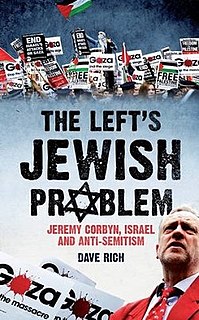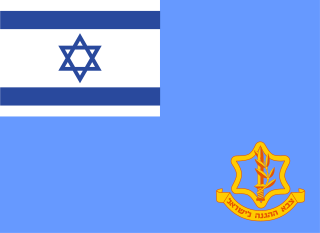 W
WThe 2006 Israeli reserve soldiers' protest was a protest movement which called for the resignation of the government and the establishment of a state commission of inquiry into what they argued were crucial failures experienced during the 2006 Israel-Lebanon conflict. From late August to early October 2006, some of its followers were stationed in a tent city besides the Israeli government building, and several large demonstrations were carried out to protest against the conduct of the government before, during, and after the war.
 W
WAnnexation of the Jordan Valley is the proposed application of Israeli sovereignty over the Jordan Valley. The idea has been advocated by some Israeli politicians since the Israeli occupation of the West Bank began in 1967, most notably with the Allon Plan and the 2020 Trump peace plan.
 W
WThe Bahrain–Israel normalization agreement, officially Abraham Accords: Declaration of Peace, Cooperation, and Constructive Diplomatic and Friendly Relations is an agreement to normalize diplomatic and other relations between Bahrain and Israel. The agreement was announced by President Donald Trump on September 11, 2020, and followed on from a joint statement, officially referred to as the Abraham Accords, by the United States, Israel and the United Arab Emirates (UAE) on August 13, 2020. It was formally signed on September 15, 2020, at the White House in Washington, D.C., and made Bahrain the fourth Arab state to recognize Israel and the second within a month.
 W
WBasic Law: The Government is a Basic Law, first legislated in the Sixth Knesset, on 13 August 1968. It was substituted by an additional Basic Law: The Government of 1992, in the Twelfth Knesset on 18 March 1992, in order to change the electoral system, with the purpose of creating a direct prime ministerial elections system. After concluding the old parliamentary system of government was the best option for the complex composition of the Israeli society, it was once again substituted by an additional Basic Law: The Government of 2001, in the Fifteenth Knesset, on 7 March 2001, in order to cancel the previous additional law of 1992 that had replaced the original law of 1968, and with the purpose of restoring the old parliamentary system.
 W
WThe Basic Laws of Israel are thirteen constitutional laws of the State of Israel, and some of them can only be changed by a supermajority vote in the Knesset. Many of these laws are based on the individual liberties that were outlined in the Israeli Declaration of Independence. The Basic Laws deal with the formation and role of the principal institutions of the state, and with the relations between the state's authorities. They also protect the country's civil rights, although some of these rights were earlier protected at common law by the Supreme Court of Israel. The Basic Law: Human Dignity and Liberty enjoys super-legal status, giving the Supreme Court the authority to disqualify any law contradicting it, as well as protection from Emergency Regulations.
 W
WThe Civil Administration is the Israeli governing body that operates in the West Bank. It was established by the government of Israel in 1981, in order to carry out practical bureaucratic functions within the territories captured by Israel in 1967. While formally separate, it was subordinate to the Israeli military and the Shin Bet.
 W
WDani Dayan is an Argentine-Israeli entrepreneur and Consul General of Israel in New York since August 2016. He was appointed as the chairman of the Directorate of Yad Vashem in August 2021. Dayan is an advocate for the establishment and maintenance of Israeli settlements in the West Bank. He served as the Chairman of the Yesha Council from 2007 to 2013. In 2013, he resigned as Chairman of the Yesha Council to endorse Benjamin Netanyahu for Prime Minister. Dayan was subsequently appointed as Chief Foreign Envoy of the Yesha Council, as the only official representative of the Israeli settlement movement to the international community. After a diplomatic stand-off over its assignment of former settler leader Dayan as ambassador to Brazil without consulting the government of Brasilia, Israel backed off and in March 2016 assigned Dayan as Consul General of Israel in New York.
 W
WHafrada is the policy of the Government of Israel to separate the Israeli population from the Palestinian population in the occupied Palestinian territories, in both the Palestinian enclaves of the West Bank and the Gaza Strip.
 W
WHolocaust inversion is the antisemitic act of portrayal of Jews as Nazis, crypto-Nazis, Nazi sympathizers, genocide perpetrators, or Holocaust copycats, thus making Jews out to be morally equivalent to or worse than the perpetrators of the Holocaust, or in some cases blaming them for the Holocaust as well. It is a rhetorical staple of anti-Zionism in relation to the Israeli–Palestinian conflict.
 W
WThe Israel–Jordan peace treaty, sometimes referred to as the Wadi Araba Treaty, is an agreement that ended the state of war that has existed between the two countries since the 1948 Arab–Israeli War and established mutual diplomatic relations. In addition to establishing peace between the two countries, the treaty also settled land and water disputes, provided for broad cooperation in tourism and trade, and obligated both countries to prevent their territory being used as a staging ground for military strikes by a third country.
 W
WThe Israel–Morocco normalization agreement is an agreement announced by the United States government on December 10, 2020, in which Israel and Morocco agreed to begin normalizing relations. On December 22, 2020, a joint declaration was signed pledging to quickly begin direct flights, promote economic cooperation, reopen liaison offices and move toward "full diplomatic, peaceful and friendly relations." Morocco officially recognized Israel in its communication to Israeli Prime Minister Benjamin Netanyahu.
 W
WThe Israel–United Arab Emirates normalization agreement, officially the Abraham Accords Peace Agreement: Treaty of Peace, Diplomatic Relations and Full Normalization Between the United Arab Emirates and the State of Israel, was initially agreed to in a joint statement by the United States, Israel and the United Arab Emirates (UAE) on August 13, 2020, officially referred to as the Abraham Accords. The UAE thus became the third Arab country, after Egypt in 1979 and Jordan in 1994, to agree to formally normalize its relationship with Israel, as well as the first Persian Gulf country to do so. Concurrently, Israel agreed to suspend plans for annexing parts of the West Bank. The agreement normalized what had long been informal but robust foreign relations between the two countries. The agreement was signed at the White House on September 15, 2020. It was approved unanimously by the Israeli cabinet on October 12 and was ratified by the Knesset on October 15. The UAE parliament and cabinet ratified the agreement on October 19.
 W
WThe Israeli disengagement from Gaza was the unilateral dismantling in 2005 of the 21 Israeli settlements in the Gaza Strip and the evacuation of Israeli settlers and army from inside the Gaza Strip.
 W
WThe Jerusalem Law is a common name of Basic Law: Jerusalem, Capital of Israel passed by the Knesset on 30 July 1980.
 W
WLand Day, March 30, is a day of commemoration for Arab citizens of Israel and Palestinians of the events of that date in 1976 in Israel.
 W
WIn Israel, the Leader of the Opposition is the politician who leads the Official Opposition in the Knesset, the Israeli parliament. The Leader of the Opposition is, by convention, the leader of the largest political party in the Knesset that is not in the government.
 W
WThe Left's Jewish Problem: Jeremy Corbyn, Israel and Anti‑Semitism is a 2016 book by Dave Rich. The book argues that new antisemitism is "masked as anti-Zionism" in left-wing politics.
 W
WA number of states and individuals have questioned the legitimacy of the State of Israel, specifically, whether Israel's political authority over the area it claims should be accepted as legitimate political authority. The argument as to the legitimacy of the State of Israel is also couched in terms of Israel's right to exist.
 W
WThe Israeli Military Governorate was a military governance system established following the Six-Day War in June 1967, in order to govern the civilian population of the West Bank, the Gaza Strip, the Sinai Peninsula and the Western part of Golan Heights. The governance was based on the Fourth Geneva Convention, which provides guidelines for military rule in occupied areas. East Jerusalem was the only exception from this order, and it was added to Jerusalem municipal area as early as 1967, and extending Israeli law to the area effectively annexing it in 1980. During this period, the UN and many sources referred to the military governed areas as Occupied Arab Territories.
 W
WThe politics of archaeology in Israel and Palestine refers to the significance of archaeology in the politics and social fabric of Israel and Palestine. Many important developments in Levantine archaeology have occurred within Israel and Palestine.
 W
WThe Provisional State Council was the temporary legislature of Israel from shortly before independence until the election of the first Knesset in January 1949. It took the place of His Majesty's Privy Council, through which the British Government had legislated for Mandatory Palestine.
 W
WThe realignment plan was a plan by Israel to unilaterally disengage from 90% of the West Bank and annex the rest, incorporating most Israeli settlements into Israel. The plan was formulated and introduced to the Israeli public by then acting prime minister, Ehud Olmert in a number of media interviews during the election campaign for the 17th Knesset in March 2006. The Convergence Plan was originally scheduled to be implemented within 18 months from early May 2006, but in November 2007, Olmert said that he hoped to implement it within three to four years.
 W
WRestoring Courage was a campaign announced on May 2011 by media personality Glenn Beck featuring a media event that took place in Jerusalem, on August 24, 2011, "to stand with the Jewish people". While announcing the rally, he expressed a belief that a two-state solution would "[cut] off Jerusalem, the Old City, to the rest of the world". Beck said security arrangements and logistics would pose a challenge: "The very gates of hell will open up against us." Beck's Mercury Radio Arts sponsored three rallies or observances associated with Restoring Courage, including a rally attended by hundreds of supporters on August 24 at the Southern Wall of the Temple Mount.
 W
WThe Israeli system of government is based on parliamentary democracy. The Prime Minister of Israel is the head of government and leader of a multi-party system. Executive power is exercised by the government. Legislative power is vested in the Knesset. The Judiciary is independent of the executive and the legislature. The political system of the State of Israel and its main principles are set out in 11 Basic Laws. Israel does not have a written constitution.
 W
WUzi Eilam is a retired IDF brigadier general and former director of the Israel Atomic Energy Commission. Closely involved in many of the most crucial decision-making events in the State of Israel’s history, he had commanded various Israeli military units during his service to IDF.
 W
WWater politics in the Middle East deals with control of the water resources of the Middle East, an arid region where issues of the use, supply, control, and allocation of water are of central economic importance. Politically contested watersheds include the Tigris–Euphrates river system which drains to the south-east through Iraq into the Persian Gulf, the Nile basin which drains northward through Egypt into the eastern Mediterranean Sea, and the Jordan River basin which flows into the Dead Sea, a land-locked and highly saline sea bordered by Jordan to the east and Israel to the west.